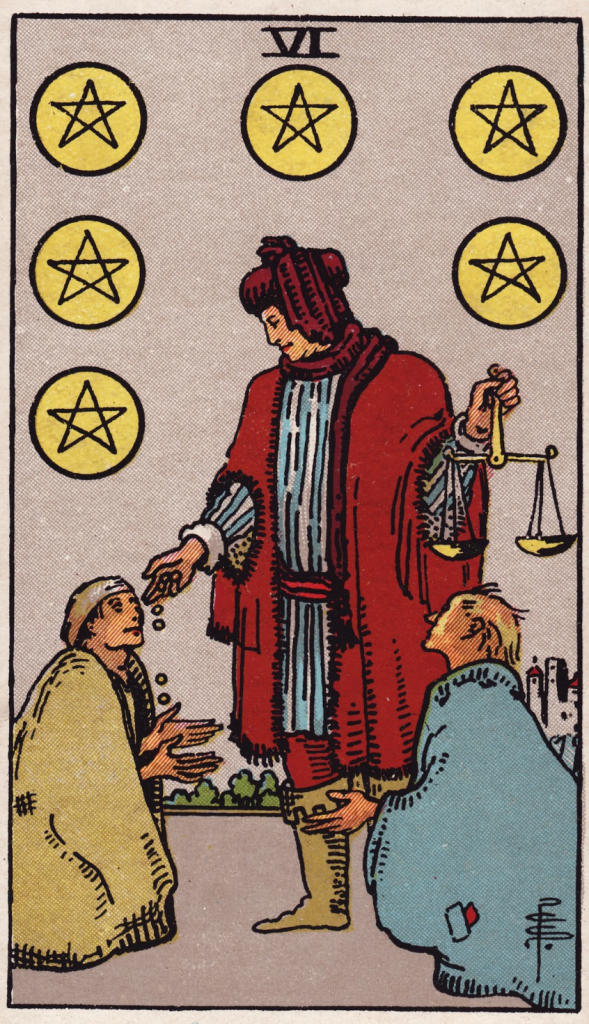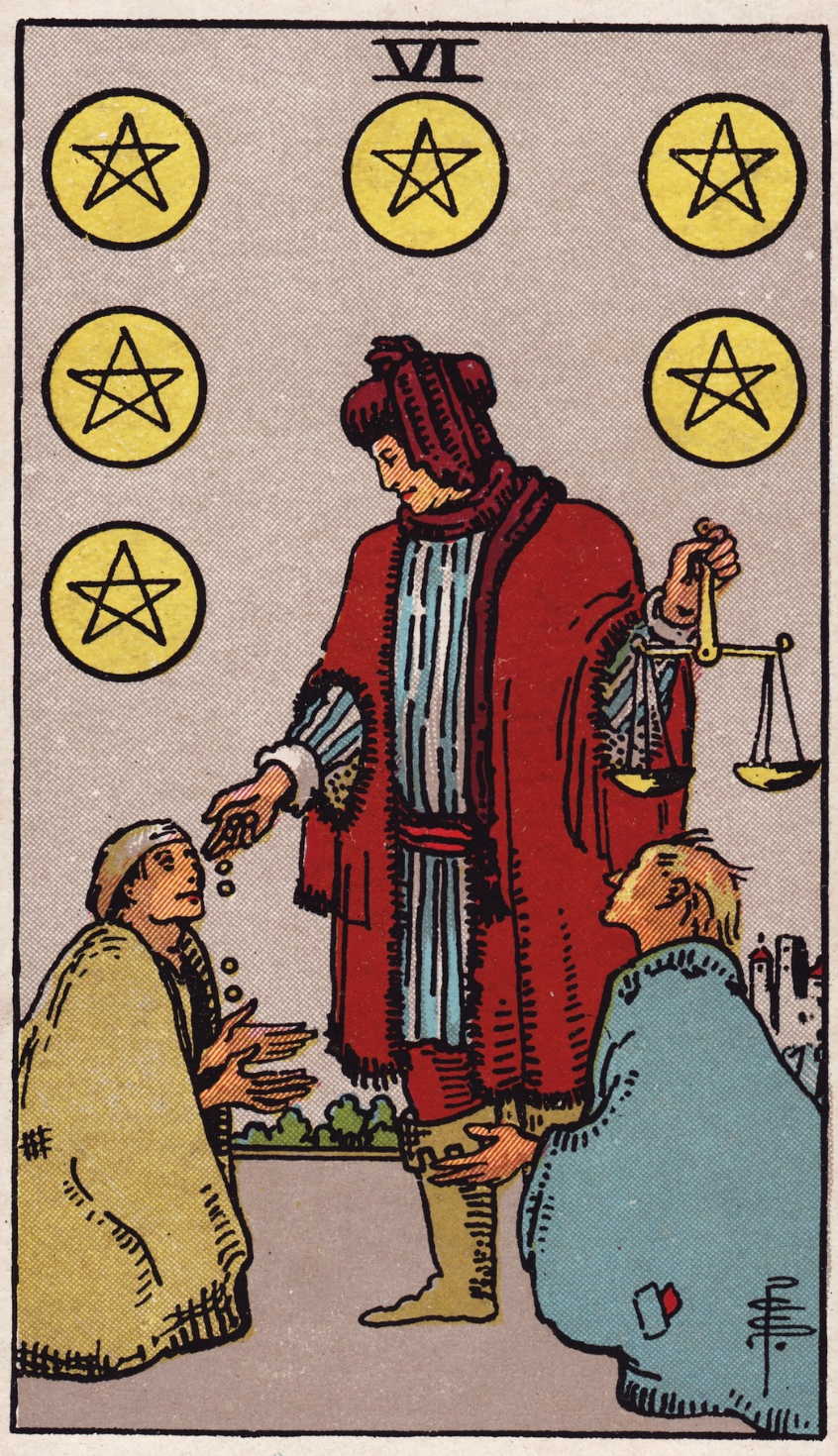
The Six of Pentacles is the card of generosity, gratitude, community, support, and sharing. This card shows a wealthy man handing out coins to two beggars who kneel at his feet. He holds out a balanced scale, representing fairness and justice.
The Six of Pentacles reminds us that there is a constant give and take in relationships. Sometimes, you are on the giving end, and sometimes, you are on the receiving end. This card is also a reminder for us to be fair in our interactions with others. Be open to receiving generosity, and also be generous with others when you are in the position to do so.
Upright Meaning:
If the Six of Pentacles appears in a Tarot spread as a person, that means that this person is generous, charitable, or in a position to offer help or resources to others. This individual embodies the spirit of giving and is often seen as a benefactor in their community or circle. They are recognized for their willingness to assist those in need and are respected for their compassionate and altruistic nature.
For physical characteristics, the Six of Pentacles as a person represents someone who appears benevolent and approachable, often seen as a giver or provider in their community. They might have a warm and inviting demeanor, with a friendly smile that puts others at ease. Their appearance may suggest affluence or comfort, but it’s their open and generous posture that truly defines them, indicating their readiness to help and support others.
For emotional characteristics, the Six of Pentacles as a person represents someone who is kind-hearted, empathetic, and willing to share their resources or knowledge. They are often sensitive to the needs of others, possessing a deep sense of empathy that drives their charitable actions. This person finds joy in helping others, often feeling emotionally fulfilled when they can make a positive difference in someone’s life.
Astrologically, the Six of Pentacles as a person represents someone who is likely influenced by the positive aspects of Earth signs, showing a practical approach to generosity and balance. These Earth sign influences, potentially from Taurus, Virgo, or Capricorn, endow them with a grounded and pragmatic approach to helping others. Their astrological placements likely emphasize stability and the importance of material support, aligning with their charitable nature.
For careers, the Six of Pentacles can represent someone who works in philanthropy, charity, or any field where they are in a position to offer financial or material assistance. They may be involved in non-profit organizations, social work, or in a corporate role that focuses on community outreach and corporate social responsibility. Their career choices often reflect their desire to create a positive impact and to distribute resources in a way that benefits those less fortunate.
The Six of Pentacles as a person represents someone who makes you feel supported and cared for, reminding you of the importance of generosity and reciprocity. Their presence in your life can inspire you to practice kindness and to consider the impact of giving and receiving. They embody the principle that sharing one’s blessings with others enriches both the giver and the receiver, creating a cycle of generosity and gratitude.
Reversed Meaning:
If the Six of Pentacles reversed appears in a Tarot spread as a person, that means that this person is experiencing an imbalance in giving and receiving, possibly feeling exploited or being overly controlling with resources. This reversal suggests a struggle with the concept of generosity, either due to feeling taken advantage of or from a reluctance to part with their resources. The individual might be grappling with issues related to fairness and the distribution of wealth or support.
For physical characteristics, the Six of Pentacles reversed as a person represents someone who may appear protective of their resources, or showing signs of distress over financial inequities. They might have a closed-off body language or a cautious gaze, indicating a sense of guardedness about their possessions or wealth. Their appearance could suggest tension or anxiety, possibly stemming from financial concerns or a fear of losing what they have.
For emotional characteristics, the Six of Pentacles reversed as a person represents someone who is struggling with issues of fairness, possibly feeling either taken advantage of or being overly miserly. They may exhibit feelings of resentment or frustration, especially in situations where they perceive an imbalance in the give-and-take of resources. This person might struggle with trust issues, finding it hard to believe that others will reciprocate their generosity or fearing that their kindness will be exploited.
Astrologically, the Six of Pentacles reversed as a person represents someone who is dealing with the challenging aspects of Earth signs, such as material greed or an inability to share. These difficulties might stem from problematic aspects in their Taurus, Virgo, or Capricorn placements, leading to an overemphasis on material security or a lack of willingness to part with their resources. The astrological influences may manifest as a struggle to find a healthy balance between generosity and self-protection.
For careers, the Six of Pentacles reversed can represent someone who works in an environment where there is financial imbalance, whether they are on the giving or receiving end. They may be in a position where they feel undervalued or undercompensated, or they could be in a role that involves making difficult decisions about resource allocation. This career situation might reflect their internal conflict between wanting to be generous and feeling the need to protect their own interests.
The Six of Pentacles reversed as a person represents someone who makes you feel aware of the complexities of financial relationships and the need for balance in giving and receiving. Their situation serves as a reminder that generosity should not lead to self-sacrifice, nor should self-interest prevent one from helping others. Encountering this individual can inspire a deeper understanding of the nuances of financial and emotional support, highlighting the importance of equitable and balanced relationships.
